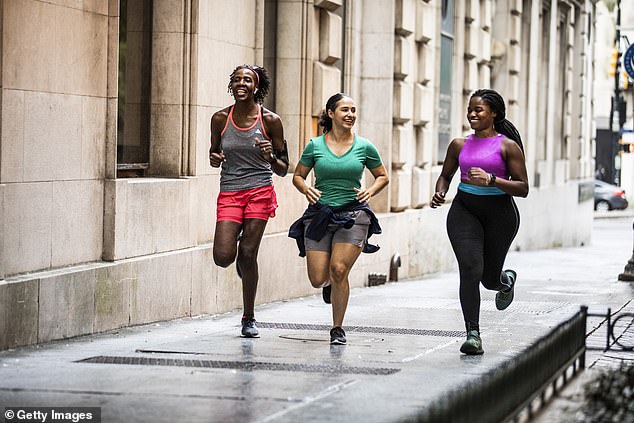
Finding it difficult to keep up with your summer workout goals? Your personality may be to blame.
Based on an eight-week experiment, researchers from the University College London have discovered that matching your exercise routine to your personality could make it more enjoyable and give you better results.
The scientists measured strength levels, as well as the prominence of different personality traits during the study.
They found that extroverts preferred high-intensity workouts, while people who tend to worry favored short bursts of activity and saw greater stress reduction from exercise.
The scientists also pointed out that the most important part about exercising was doing something that brought joy to you.
Study author Dr Flaminia Ronca from UCL Institute of Sport, Exercise and Health said: ‘We found some clear links between personality traits and the type of exercise the participants enjoyed most, which I think is important because we could potentially use this knowledge to tailor physical activity recommendations to the individual – and hopefully help them to become and remain more active.
‘Our brains are wired in different ways, which drives our behaviors and how we interact with our environment.
‘So it’s not surprising that personality would also influence how we respond to different intensities of exercise.’

Extroverts preferred high-intensity workouts while people who tend to worry favored short bursts of activity and saw greater stress reduction from exercise
The American Heart Association recommends adults engage in moderate-intensity aerobic activity for about 150 minutes per week, including 75 minutes per week of vigorous aerobic activity or a combination of both, preferably spread throughout the week.
For this study, the team divided 86 volunteers with a range of fitness levels and backgrounds into two groups.
The first group, consisting of 25 people, was provided with an eight-week home-based fitness plan made up of cycling and strength training. The other group of 51 people continued their usual lifestyle and were only asked to stretch twice a week.

Study author Dr Flaminia Ronca from UCL Institute of Sport, Exercise and Health
During the exercise program, all participants were also asked to rate their enjoyment of each exercise session.
Variations in their strength before and after the experiment was also measured through push ups, the ability to hold a plank and jumping.
This was followed by a low intensity cycling session for 30 minutes and then a cycling test to measure their oxygen capacity.
Additionally, scientists also studied participants’ personality traits, including sociability, diligence, agreeableness, openness and negative emotions such as fear of failure, anxiety and self doubt in each participant by asking them to answer a questionnaire.
The team also assessed their perceived stress levels on a scale of one to 10.
Results showed that those who scored high on diligence and openness were found to engage in exercise regardless of whether they enjoyed it or were driven by curiosity to try a new workout respectively.

Both men (blue) and women (red) who said they exercised more each week tended to be more organized, diligent and responsible
Participants who were found to be very diligent also tended to have a well-rounded fitness level – meaning they scored higher on aerobic fitness as well as core strength – and were generally more physically active.
While those who showed more anxiety and self doubt preferred private workouts and needed short breaks in between their sessions.
Notably, the study also showed that the stress levels in people who experienced negative emotions significantly decreased after they began working out on their own or in private sessions.
Dr Ronca said: ‘It’s fantastic news, as it highlights that those who benefit the most from a reduction in stress respond very well to exercise.’
Senior author Professor Paul Burgess from the UCL Institute of Cognitive Neuroscience explained: ‘We found that people who scored more highly in the neuroticism personality trait showed a particularly strong reduction in stress when they undertook the fitness training recommended in the study.
‘This suggests that there may be particular benefits in stress reduction for those with this trait.’
Previous research shows that people with anxiety and stress may find private exercise particularly more enjoyable than working out in a group as it makes them feel less conscious and removes worry about being judged or compared to others.

Those who showed more anxiety and self doubt preferred private workouts and needed short breaks in between their sessions
This allows them to feel more in control and they are able to focus more on their personal needs and preferences – which in turn, leads to their stress levels to decrease.
Additionally, people who were very social and outgoing enjoyed high intensity sessions with others around such as high intensity interval training (HIIT), team sports and intense cycling
The researchers noted that all 86 participants ended the study noticeably stronger and fitter by the time after the eight weeks.
Professor Burgess added: ‘We hope that if people can find physical activities that they enjoy they will more readily choose to do them.
‘After all, we don’t have to nag dogs to go for a walk: being so physically inactive that we start to feel miserable might be a peculiarly human thing to do. In effect, our body punishes us by making us miserable.
‘But for some reason, many of us humans seem poor at picking up on these messages it is sending to our brain.’
The study was published in Frontiers in Psychology on July 7.





